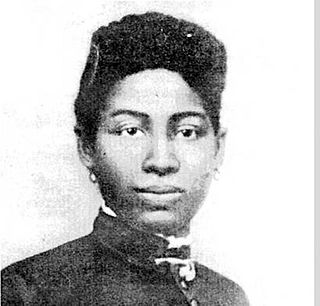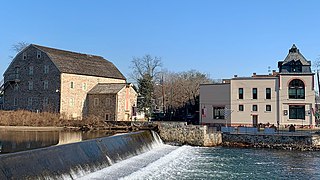
Denmark is a city in Bamberg County, South Carolina, United States. The population at the 2010 census is 3,538.

Ralph Adams Cram was a prolific and influential American architect of collegiate and ecclesiastical buildings, often in the Gothic Revival style. Cram & Ferguson and Cram, Goodhue & Ferguson are partnerships in which he worked. Cram was a fellow of the American Institute of Architects.

Anderson University is a private university in Anderson, South Carolina, United States. It offers bachelor's, master's, and doctoral degrees in over 100 areas of study. Anderson is affiliated with the South Carolina Baptist Convention and is accredited by the Commission on Colleges of the Southern Association of Colleges and Schools. Anderson participates in NCAA Division II athletics and is a member of the South Atlantic Conference.

Marycrest College Historic District is located on a bluff overlooking the West End of Davenport, Iowa, United States. The district encompasses the campus of Marycrest College, which was a small, private collegiate institution. The school became Teikyo Marycrest University and finally Marycrest International University after affiliating with a Japanese educational consortium during the 1990s. The school closed in 2002 because of financial shortcomings. The campus has been listed on the Davenport Register of Historic Properties and on the National Register of Historic Places since 2004. At the time of its nomination, the historic district consisted of 13 resources, including six contributing buildings and five non-contributing buildings. Two of the buildings were already individually listed on the National Register.
Voorhees University is a private historically black university in Denmark, South Carolina, United States. It is affiliated with the Episcopal Church and accredited by the Southern Association of Colleges and Schools.
This is an incomplete list of historic properties and districts at United States colleges and universities that are listed on the National Register of Historic Places (NRHP). This includes National Historic Landmarks (NHLs) and other National Register of Historic Places listings. It includes listings at current and former educational institutions.

Edward Brickell White, also known as E. B. White, was an architect in the United States. He was known for his Gothic Revival architecture and his use of Roman and Greek designs.

Elizabeth Evelyn Wright was an American humanitarian and educator, founding several schools for black children. She founded Denmark Industrial Institute in Denmark, South Carolina, as a school for African-American youth. It is present-day Voorhees College, a historically black college (HBCU).

Leonard Hall is a historic educational building located on the campus of Shaw University in Raleigh, North Carolina. Built in 1881 and originally named Leonard Medical Center, it became known as Leonard Medical School, and then Leonard Hall. It was established when medical schools were professionalizing and was the first medical school in the United States to offer a four-year curriculum. It was also the first four-year medical school that African Americans could attend.

Saint Mary's School is a private independent Episcopal college-preparatory, boarding and day school for girls in grades 9–12. Located in Raleigh, North Carolina, Saint Mary's School operates as an independent school with a historic association with the Episcopal Church including an Episcopal chapel, St. Mary's Chapel, on the school's grounds. The school formerly operated as Saint Mary's College and for many decades educated young women in grades 11–12 and their freshman and sophomore years in college. The school changed to a four year high school in 1998, at which point the name reverted to Saint Mary's School, the original name of the institution when it was founded in 1842.

St. Katherine's Historic District is located on the east side Davenport, Iowa, United States and is listed on the National Register of Historic Places. It is the location of two mansions built by two lumber barons until it became the campus of an Episcopal girls' school named St. Katharine's Hall and later as St. Katharine's School. The name was altered to St. Katharine-St. Mark's School when it became coeducational. It is currently the location of a senior living facility called St. Katherine's Living Center.

Washington Hall is a historic building and a registered city landmark in Seattle, Washington, that is listed on the National Register of Historic Places. It was originally built as a community center by the Danish Brotherhood in America, a fraternal organization, with meeting halls and one-room apartments for new immigrants. In 1973, the building was sold to the Sons of Haiti who leased the space to various tenants. It was purchased in 2009 by Historic Seattle and was renovated and re-opened in 2010 as an events and performance space.

College Square Historic District is a nationally recognized historic district located on a bluff north of downtown Davenport, Iowa, United States. It was listed on the National Register of Historic Places in 1983. The district derives it name from two different colleges that were located here in the 19th century.

Charles C. Wilson was an American architect in practice in Columbia, South Carolina, from 1896 until his death in 1933.

The Baldwin-Wallace College South Campus Historic District is an area of land on the south end of the Baldwin Wallace University campus. When the district was established, the school was Baldwin-Wallace College. BW is a four-year private, coeducation, liberal arts college in Berea, Ohio, United States. The school was founded in 1845 as Baldwin Institute by Methodists settlers. Eventually the school merged with nearby German Wallace College in 1913 to become Baldwin-Wallace College, which adopted the present name in 2012. Several buildings since its founding have been established on the National Register of Historic Places, establishing this area as the Baldwin-Wallace College South Campus Historic District.

Liberty Hall is located in Bedford County in Forest, Virginia. It is one of the very few Federal-Style homes still standing today from the 1700s in the Central Virginia area. It was built in 1778 as a family home. Rutherford B. Hayes and William McKinley once visited the home during the Civil War. Many homes were burnt in Forest, Virginia in the 1800s yet Liberty Hall was spared. The first owner of Liberty Hall was the founder of Augusta Academy which is now Washington and Lee University. Liberty Hall is now a private residence that has stayed in the family for over 100 years. It is listed on the National Register of Historic Places.

The Jugtown Historic District consists of a cluster of historic buildings surrounding the intersection of Harrison Street and Nassau Street in Princeton, New Jersey. The settlement dates to colonial times and is sometimes known as Queenston. In 1987, the district was listed on the National Register of Historic Places.
The Danforth Chapel Program was funded by the Danforth Foundation, an organization created in 1927 by William H. Danforth, founder of the Ralston Purina Company, and his wife. The Danforth Foundation focused on national education philanthropy: providing scholarships to college students, supporting projects to revitalize the city of St. Louis, and funding the Danforth Chapels. The Danforth Foundation closed in 2011 with a gift of $70M to the Donald Danforth Plant Center, a research center that focuses on solving world hunger.

The Clinton Historic District is a 175-acre (71 ha) historic district encompassing much of the town of Clinton in Hunterdon County, New Jersey. It was added to the National Register of Historic Places on September 28, 1995, for its significance in architecture, commerce, engineering, industry and exploration/settlement. The district includes 270 contributing buildings, one contributing structure, and three contributing sites. Five were previously listed on the NRHP individually: Dunham's Mill, M. C. Mulligan & Sons Quarry, Music Hall, Old Grandin Library, and Red Mill.




















